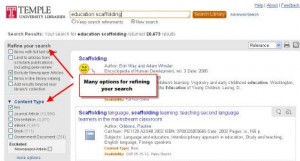The eighth annual Library Prize for Undergraduate Research and the second annual Library Prize for Undergraduate on Sustainability & the Environment will be held in the Spring 2012 semester. The purpose of the prize is to encourage the use of the Libraries’ resources and to highlight the best research among Temple undergraduates. This year’s prize submission deadline is Wednesday, March 28, 2012 at 5 pm.
This year the eligibility requirements have changed to include students participating in the McNair Scholars Program, The Creative Arts, Research and Scholarship (CARAS) Program, and students who finish their coursework in December 2011 and graduate in January. Below are the complete eligibility requirements.
To be eligible to win the 2012 Prize, applicants must:
- be Temple undergraduates at any class level and in any discipline, and be enrolled, i.e. taking a class or classes, in the Spring 2012 semester or having completed all undergraduate coursework during the Fall 2011 semester (i.e. graduating in January 2012).
- have completed their research project for a credit course at Temple during the Spring 2011, Summer 2011, Fall 2011, or Spring 2012 semesters, or began The Ronald McNair Post-Baccalaureate Achievement Program in the Summer of 2011 or received funding for The Creative Arts, Research and Scholarship (CARAS) Program during the Spring or Fall of 2011.
- agree to contribute to a display about their research in theLibrary during the year following receipt of the Sustainability Prize
- agree that all winning prize materials will become permanent property of the University Archives and may be displayed on the Library’s website
- agree to attend the Library Prize Awards Ceremony during the week of April 30 to May 4, 2012. (You need to attend the Awards Ceremony in order to win the Library Prize.)
We look forward to another great year for the Library Prize. If you have any questions about the new eligibility requirements, or any other questions, please email the libprize@temple.edu.


